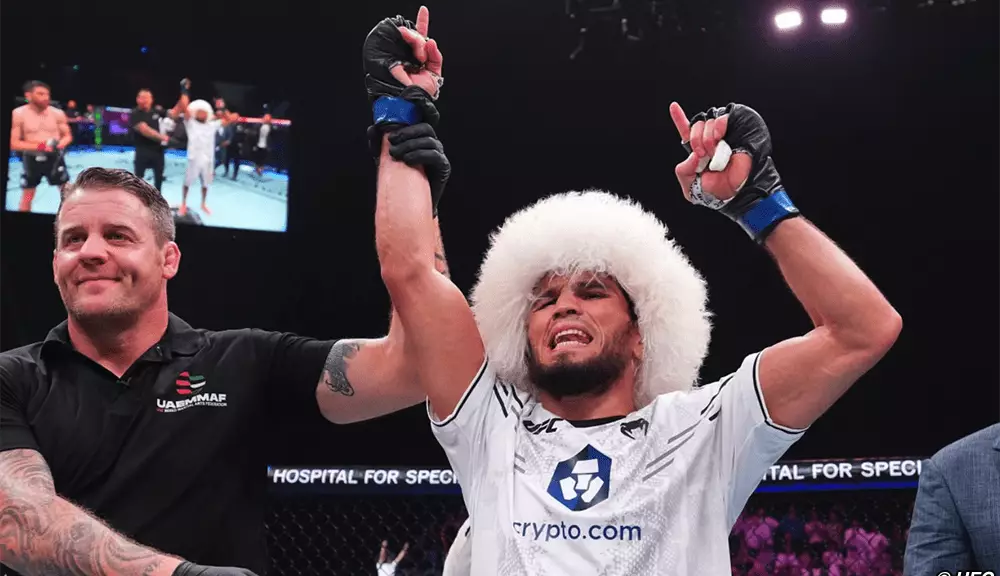Merab Dvalishvili has publicly expressed his disapproval of Umar Nurmagomedov being granted a title shot. This situation has stirred significant discussion within the UFC community, with Dvalishvili arguing that there are more worthy contenders in the bantamweight division. Set to take place at UFC 311 on January 18, 2024, in Inglewood, California, this match is not merely a contest; it embodies differing perceptions of meritocracy and opportunity within the sport.
Umar Nurmagomedov, who holds an impressive record of 18-0, including 6-0 in the UFC, stands at a pivotal moment in his career. While some fans and analysts might support Dvalishvili’s perspective, a significant portion of the MMA community acknowledges the integrity of Nurmagomedov’s undefeated streak and the natural opportunities that come with success.
Javier Mendez, Nurmagomedov’s coach, has countered Dvalishvili’s stance by asserting that the UFC had already indicated the winner of a previous fight between Nurmagomedov and Cory Sandhagen would be next in line for a title shot. He highlights the importance of following through on the UFC’s stated intentions, likening the situation to a commitment that should not be easily dismissed. Mendez’s comments suggest a deeper issue at play: the significance of maintaining credibility in promotional narratives, especially when stakes are this high.
Moreover, Dvalishvili’s rhetoric has led some to speculate about his motivations. Instead of viewing his comments as strictly a critique of fairness, some fans propose that his concerns stem from potential threats to his championship status. It is a common theme in competitive sports where the champion often feels pressure not just to win, but to silence any emerging contenders.
The bantamweight division, known for its depth and talent, creates a complex landscape where every title shot is contested fiercely. In the midst of this competitive environment, Dvalishvili and Mendez represent two distinct viewpoints. While Dvalishvili appears to advocate for a more stringent selection process for title shots, Mendez argues for a more traditional understanding, where success in the Octagon, as reflected in win-loss records, must be paramount.
The dynamic between Dvalishvili and Nurmagomedov is indicative of a broader trend in sports debates: the clash between merit and narrative. Fans often align with fighters whose journeys resonate with their ideals, leading to often-enflamed discussions about fairness, deservingness, and the nature of competition itself.
As UFC 311 approaches, the anticipation surrounding the Dvalishvili vs. Nurmagomedov matchup will likely intensify. Mendez has suggested that Nurmagomedov will maintain an advantage in both striking and grappling, asserting that preparation is key in this contest. This poses an intriguing question: how will Dvalishvili’s high-level wrestling, which has previously outperformed Olympic champions like Henry Cejudo, stack up against the strategic components Nurmagomedov will bring to the fight?
Understanding both fighters’ backgrounds and training methods will provide insight into how this fight plays out. Dvalishvili’s remarkable conditioning and relentless wrestling approach could position him as a formidable foe against Nurmagomedov’s diverse striking and grappling style.
Mendez remains confident, stating that the key to victory lies in the ability to adapt mid-fight, indicating that Nurmagomedov will need to engage in a multifaceted battle rather than relying solely on established strategies. The mental and physical preparations of both fighters will be crucial in determining the outcome, creating an atmosphere ripe for competition and potential surprises.
The buildup to UFC 311 presents not only a significant athletic contest but also a rich dialogue about merit, opportunity, and the complexities of competition in mixed martial arts. As Dvalishvili and Nurmagomedov prepare to step into the Octagon, fans will witness not just an exhibition of skill but a reflection of varying philosophies within one of the most competitive divisions in the UFC. The title shot debate extends beyond rankings and records; it challenges the very fabric of what it means to earn one’s place in sports.

